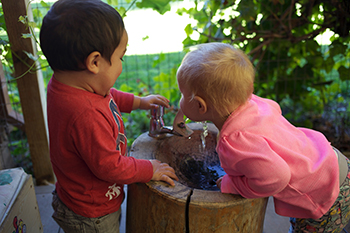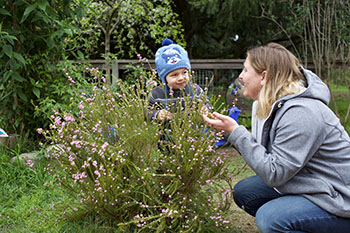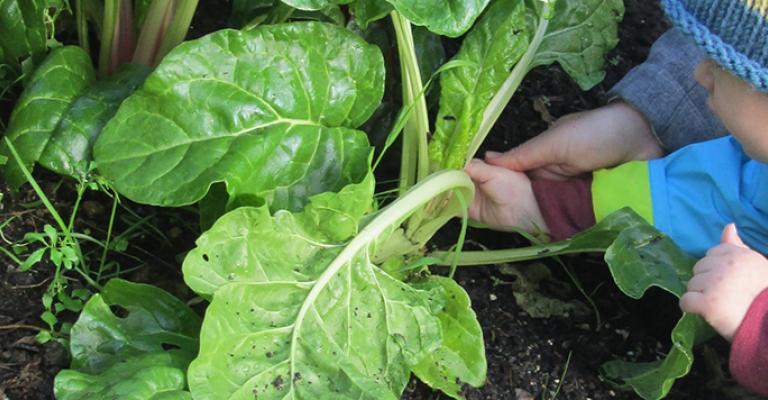Rosebud Environment

The Rosebuds classroom is for our youngest students, ages 12 months to 2 years. In this classroom, children are learning the first stages of independence and beginning to develop their physical, emotional, cognitive, and social skills. We aim to honor this development by respecting each child's individual growth and fostering a sense of wonder and curiosity within the classroom environment. The Rosebuds classroom is based on the philosophy of Primary Care. This means that each child will have a teacher assigned to help them through their day. The child can develop a close and consistent relationship with their Primary Care teacher, forming a close attachment which promotes independence, trust and self-confidence within the environment. Growth at this age happens rapidly, and our teachers and the learning environment are adaptable to the child's needs and development. We aim to provide the children with opportunities to explore and develop their gross motor skills; such as climbing, crawling, jumping, walking,


Children's Interests and Curriculum
Cooking
In the Rosebuds classroom we talk about taste, and explore the many different fruits and vegetables that are in season and the wats we can use them. The Rosebuds have helped prepare zucchini salad, bake blackberry muffins, and make raspberry and lemon popsicles. Cooking activities allow children to explore their sense of smell, touch, and taste as well as using their different skills such as fine motor and language.
Gardening
The Rosebuds are always eager to help water, plant seeds, harvest, and pull weeds in our outdoor classroom. We observer how the Rosebuds interests and curiosities lead them through the garden by picking and tasting their own plums, finding large stcks, and watching birds fly by. The Rosebuds also visit the Children’s School Community Garden once a week where they are responsible for helping to feed the chickens and collect eggs. Rosebuds may also experience the living systems through digging in the dirt, searching for creatures, watering the plants, and harvesting and tasting the veggies and fruits that are seasonal.
Painting
One of the Rosebuds favorite activities is discovering all the different materials and ways that they can use paint. The Rosebuds have found that painting with toothbrushes, balls, and plastic animals to be a fun way notice a cause and effect relationship and how to make things happen. We have noticed that the Rosebuds find many ways to paint with different mediums such as water and mud which allows them to investigate their sense of touch.
Home/School Connections
- Talk with your Rosebud about the ingredients that go into a meal. Are the ingredients in-season? Where do they come from? What do they taste like?
- Provide your Rosebud with a small shovel to scoop dirt or spill in your yard. Add a flower pot to fill and dump the soil or dirt.
- Provide your Rosebud with a house paintbrush and a cup of water to paint on the sidewalk.
Main Areas of Development: Early Learning Foundations/DROP
From the California Infant Toddler Learning Foundations
- Interactions with adults are a frequent and regular part of infants’ daily lives pg. 8.
- Children listen to the adult and participate while being read to by pointing, turning pages , or making one- or two-word comments. Children actively notice print in the environment” pg 53.
- Children are able to hold small objects in one hand and some times use both hands together to manipulate objects. (18 mos.: Meisels and others 2003, 40)” pg. 98.
| Approximate Time | Activities | What the Children Do |
| 8:00-9:00 | Hand washing & Breakfast | Children are invited to wash their hands and sit down to have breakfast. |
| 7:30- 9:30 | Indoor Play | Children have the freedom to explore the inside environment. Children will participate in individual play and social play with their peers and teachers. |
| 9:30 | Hand washing & Morning Snack | Children are invited to wash their hands and sit down together for a morning snack. |
| 10:00- 11:30 | Outdoor play | Children explore the outdoor environment and partake in curriculum projects. Children will investigate equipment, look at books, play with cause and effect toys, and engage with their peers and teachers. During this time children may go on walks around campus as well as visiting the community garden. |
| 11:20 | Song time | Children are invited to sing songs and engage in body movements. |
| 11:30 | Lunch | Children was hands and sit down to eat lunch with their peers and teachers. |
| 12:00 | Nap/ Rest time | Once children are finished with their lunch they are assisted in washing their hands, checking their diaper, and laying down for a nap or resting quietly. |
| 2:30 | Hand washing & Afternoon Snack | When children wake up they are offered an afternoon snack. |
| 3:00 | Indoor/Outdoor Play | Children have the opportunity to explore the indoor or outdoor environments. Children will investigate equipment, look at books, play with cause and effect toys, and engage with their peers and teachers. |
| 5:30 | Classroom Closes (With exception to Thursday at 3:45) | Parents reconnect with their children and teachers and review the day. |


